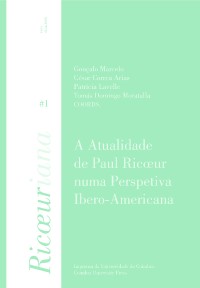Please use this identifier to cite or link to this item:
https://hdl.handle.net/10316.2/90144| DC Field | Value | Language |
|---|---|---|
| dc.contributor.author | Lythgoe, Esteban | |
| dc.date.accessioned | 2018-03-07T15:50:59Z | |
| dc.date.accessioned | 2020-09-05T11:45:54Z | - |
| dc.date.available | 2018-03-07T15:50:59Z | |
| dc.date.available | 2020-09-05T11:45:54Z | - |
| dc.date.issued | 2017 | - |
| dc.identifier.isbn | 978-989-26-1516-5 (PDF) | |
| dc.identifier.issn | 2184-190X | |
| dc.identifier.uri | https://hdl.handle.net/10316.2/90144 | - |
| dc.description.abstract | This article contrasts two models of forgiveness: one that is bipolar and another that is monopolar, and characterizes the ricoeurian proposal on this topic as being similar with the first model. Our hypothesis is that, in spite of presenting forgiveness only as a moral relationship between two individuals, it also includes a political objective: national reconciliation. This hypothesis is based on the selected example to demonstrate the benefits of forgiveness and the Hegelian background in which the development of forgiveness is based. The impossibility of a collective forgiveness leads us to suggest that social reconciliation is the indirect result of individual forgiveness. In the conclusion of this paper we will refer to an example of Argentina’s recent transitional history to illustrate certain aspects that were not noticed by Ricoeur. This example will lead us to argue that Ricoeur’s model of forgiveness, ends up benefiting those guilty of crimes of state at the expense of their victims. | eng |
| dc.description.abstract | El presente capítulo contrapone dos modelos de perdón: uno bipolar y otro monopolar, e identifica la propuesta ricoeuriana con el primero de ellos. Nuestra hipótesis es que, pese a presentar al perdón sólo como una relación moral entre dos individuos, también incluye un objetivo político: la reconciliación nacional. Esta hipótesis se funda en el ejemplo seleccionado para poner de manifiesto los beneficios del perdón y el antecedente hegeliano en el que se basa el desarrollo del perdón. La imposibilidad de un perdón colectivo, nos llevará a postular que la reconciliación social es el resultado indirecto del perdón individual. Concluiremos remitiéndonos a un ejemplo de la historia transicional de la Argentina reciente para ilustrar ciertos aspectos que fueron desapercibidos por Ricoeur. Este ejemplo nos llevará a sostener que este modelo de perdón, termina beneficiando a los culpables de crímenes de estados en detrimento de sus víctimas. | por |
| dc.language.iso | spa | - |
| dc.publisher | Imprensa da Universidade de Coimbra | por |
| dc.relation.ispartof | http://hdl.handle.net/10316.2/43630 | por |
| dc.rights | open access | - |
| dc.subject | Hegel | eng |
| dc.subject | legitimizing | eng |
| dc.subject | perlaboration | eng |
| dc.subject | reconciliation | eng |
| dc.subject | rehabilitation | eng |
| dc.subject | Hegel | por |
| dc.subject | legitimador | por |
| dc.subject | perlaboración | por |
| dc.subject | econciliación | por |
| dc.subject | rehabilitación | por |
| dc.title | Los límites del perdón ricoeuriano desde la perspectiva argentina | por |
| dc.title.alternative | The limits of Ricoeur’s concept of forgiveness from an Argentinian perspective | eng |
| dc.type | bookPart | por |
| uc.publication.firstPage | 145 | - |
| uc.publication.lastPage | 172 | - |
| uc.publication.location | Coimbra | por |
| dc.identifier.doi | 10.14195/978-989-26-1516-5_4 | - |
| uc.publication.digCollection | PB | por |
| uc.publication.orderno | 4 | - |
| uc.publication.area | Artes e Humanidades | por |
| uc.publication.bookTitle | Ricœuriana 1: a atualidade de Paul Ricœur numa perspetiva Ibero-Americana | - |
| uc.publication.manifest | https://dl.uc.pt/json/iiif/10316.2/90144/201853/manifest?manifest=/json/iiif/10316.2/90144/201853/manifest | - |
| uc.publication.thumbnail | https://dl.uc.pt/retrieve/11030252 | - |
| uc.publication.parentItemId | 55059 | - |
| uc.itemId | 68380 | - |
| item.grantfulltext | open | - |
| item.fulltext | With Fulltext | - |
| Appears in Collections: | Ricœuriana 1: a atualidade de Paul Ricœur numa perspetiva Ibero-Americana | |
Files in This Item:
| File | Description | Size | Format | |
|---|---|---|---|---|
| los_limites_del_perdon_ric_uriano_desde_la_perspectiva_argentina.pdf | 216.19 kB | Adobe PDF |  |
Items in DSpace are protected by copyright, with all rights reserved, unless otherwise indicated.
